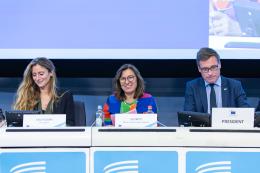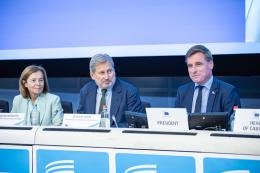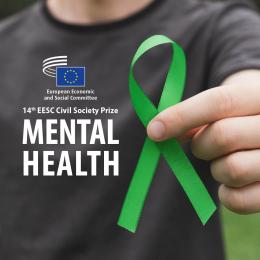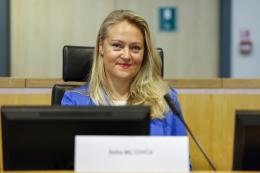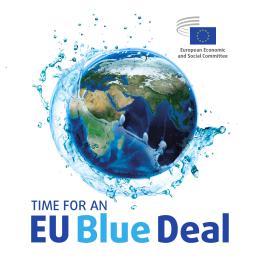European Economic
and Social Committee
Main navigation
-
Apie
ABOUT
The European Economic and Social Committee (EESC) is the voice of organised civil society in Europe.
Find out more about its role and structure at http://www.eesc.europa.eu/en/about
- Politinė struktūra
- Administracinė struktūra
- BENDRADARBIAVIMAS SU KITOMIS INSTITUCIJOMIS
- Rules
-
Mūsų darbas
OUR WORK
The EESC issues between 160 and 190 opinions and information reports a year.
It also organises several annual initiatives and events with a focus on civil society and citizens’ participation such as the Civil Society Prize, the Civil Society Days, the Your Europe, Your Say youth plenary and the ECI Day.
Find the latest EESC opinions and publications at http://www.eesc.europa.eu/en/our-work/opinions-information-reports/opinions and http://www.eesc.europa.eu/en/our-work/publications-other-work/publications respectively.
- Nuomonės ir informaciniai pranešimai
- Dokumentai
- Leidiniai ir kita veikla
-
Pilietinė visuomenė ir piliečių dalyvavimas
- Civil Society Week
- European elections 2024
- Pilietinės visuomenės premija
- The Conference on the Future of Europe
- Europos demokratijos pasas
- Tavo Europa, tavo balsas!
- Europos piliečių iniciatyva
- The path to our industrial future
- Youth Climate and Sustainability Round Tables
- EU Organic Awards
- Civil Society Against COVID 19
- EESC stands with Ukraine
- Partnerships
- Relations with ESCs
-
Politika
POLICIES
The EESC is active in a wide range of areas, from social affairs to economy, energy and sustainability.
Learn more about our policy areas and policy highlights at http://www.eesc.europa.eu/en/policies
-
Politikos sritys
- Žemės ūkis, kaimo plėtra ir žuvininkystė
- Klimato politikos veiksmai
- Sanglauda, regionų ir miestų politika
- Vartotojai
- Skaitmeniniai pokyčiai ir informacinė visuomenė
- Ekonominė ir pinigų sąjunga
- Švietimas ir mokymas
- Užimtumas
- Energetika
- Įmonės
- Aplinka
- Išorės santykiai
- Finansinės paslaugos ir kapitalo rinkos
- Pagrindinės teisės ir piliečių teisės
- Housing
- Pramonė ir pramonės permainos
- Instituciniai reikalai ir ES biudžetas
- Migracija ir prieglobstis
- Moksliniai tyrimai ir inovacijos
- Visuotinės svarbos paslaugos
- Bendroji rinka
- Socialiniai reikalai
- Tvarus vystymasis
- Mokesčiai
- Transportas
- Dėmesio centre
-
Politikos sritys
-
Darbotvarkė
AGENDA
The EESC holds nine plenary sessions per year. It also organises many conferences, public hearings and high-level debates related to its work.
Find out more about our upcoming events at http://www.eesc.europa.eu/en/agenda/our-events/upcoming-events
- Mūsų renginiai
-
Naujienos ir žiniasklaida
NEWS & MEDIA
Here you can find news and information about the EESC'swork, including its social media accounts, the EESC Info newsletter, photo galleries and videos.
Read the latest EESC news http://www.eesc.europa.eu/en/news-media/news and press releases http://www.eesc.europa.eu/en/news-media/press-releases
- President
-
Nariai ir grupės
MEMBERS & GROUPS
The EESC brings together representatives from all areas of organised civil society, who give their independent advice on EU policies and legislation. The EESC's326 Members are organised into three groups: Employers, Workers and Various Interests.
Find out more about our Members and groups at http://www.eesc.europa.eu/en/members-groups
- Nariai
- Grupės
-
Skyriai ir kiti organai
SECTIONS & OTHER BODIES
The EESC has six sections, specialising in concrete topics of relevance to the citizens of the European Union, ranging from social to economic affairs, energy, environment, external relations or the internal market.
Find out more at http://www.eesc.europa.eu/en/sections-other-bodies
-
Skyriai / komisijos
- Ekonominės ir pinigų sąjungos, ekonominės ir socialinės sanglaudos (ECO) skyrius
- Bendrosios rinkos, gamybos ir vartojimo (INT) skyrius
- Transporto, energetikos, infrastruktūros ir informacinės visuomenės (TEN) skyrius
- Užimtumo, socialinių reikalų ir pilietybės (SOC) skyrius
- Žemės ūkio, kaimo plėtros ir aplinkos (NAT) skyrius
- Išorės santykių (REX) skyrius
- Pramonės permainų konsultacinė komisija (CCMI)
- Observatorijos
- Kita
-
Skyriai / komisijos
- Ukraine





